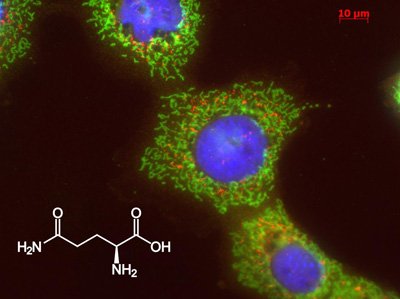Blocking LRH-1 causes liver cancer cells to starve
Posted: 13 June 2016 | Victoria White, Digital Content Producer | No comments yet
Scientists at EPFL have found a way to starve liver cancer cells by blocking a protein that is required for glutamine breakdown – LRH-1…


Fluorescent image of liver cells and chemical structure of glutamine. CREDIT: Kristina Schoonjans/EPFL
Scientists at Ecole Polytechnique Fédérale de Lausanne (EPFL) have found a way to starve liver cancer cells by blocking a protein that is required for glutamine breakdown.
Primary liver cancer is the second leading cause of cancer-related deaths worldwide. Liver cancer cells are particularly addicted to the amino acid glutamine, which fuels their proliferation. EPFL scientists have now found that a liver protein called “liver receptor homolog 1” (LRH-1) is responsible for the digestion of glutamine into smaller molecules, which are avidly consumed by liver cancer cells. Blocking LRH-1 causes cancer cells to starve and greatly reduces the development of liver cancer in mice, while preserving normal cells. The discovery may lead to new drugs that target LRH-1 to effectively treat liver cancers.
Disrupting LRH-1 protected mice against liver cancer
LRH-1 is a receptor in the cell nucleus, where it regulates the expression of various genes. In this study, scientists led by Kristina Schoonjans, discovered that LRH-1 coordinates several key genes that are involved in the metabolism of glutamine. The researchers found that LRH-1 drives the development of liver tumours by helping cancer cells to convert glutamine into molecules that are directly needed for proliferation.
This would also mean that disrupting the function of LRH-1 in the liver of mice would protect against the development of liver cancers. That is exactly what the scientists found when they studied mice that had been genetically modified to not express LRH-1 – so called “knockout” mice. After exposing them to chemical carcinogens, the livers of knockout mice showed dramatically less development of tumours.
Based on the study, LRH-1 could be a new drug target to prevent the development of liver cancer. Because cancer cells, unlike normal cells, are very often addicted to glutamine, drugs that inhibit glutamine metabolism have been proposed as new highly efficient chemotherapy agents.
“Inhibiting LRH-1 can thus be an effective way to starve only liver cancer cells, while leaving normal cells intact,” says Schoonjans. Her lab is now actively trying to identify new chemotherapeutic agents to treat liver cancers by developing specific compounds that inhibit LRH-1.
Related topics
Drug Targets, Oncology
Related organisations
Ecole Polytechnique Fédérale De Lausanne (EPFL)



